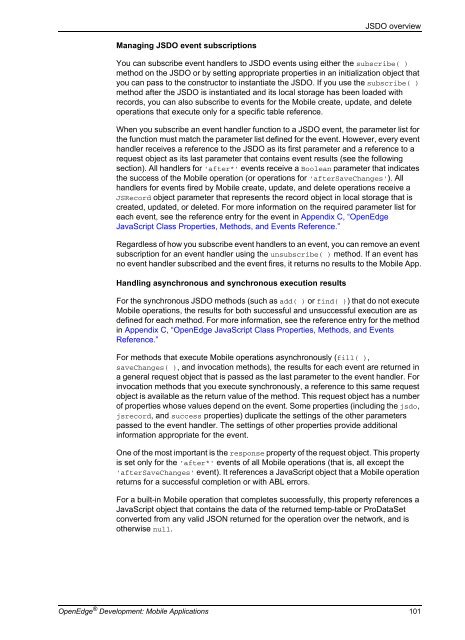OpenEdge Development: Mobile Applications - Product ...
OpenEdge Development: Mobile Applications - Product ...
OpenEdge Development: Mobile Applications - Product ...
You also want an ePaper? Increase the reach of your titles
YUMPU automatically turns print PDFs into web optimized ePapers that Google loves.
Managing JSDO event subscriptions<br />
JSDO overview<br />
You can subscribe event handlers to JSDO events using either the subscribe( )<br />
method on the JSDO or by setting appropriate properties in an initialization object that<br />
you can pass to the constructor to instantiate the JSDO. If you use the subscribe( )<br />
method after the JSDO is instantiated and its local storage has been loaded with<br />
records, you can also subscribe to events for the <strong>Mobile</strong> create, update, and delete<br />
operations that execute only for a specific table reference.<br />
When you subscribe an event handler function to a JSDO event, the parameter list for<br />
the function must match the parameter list defined for the event. However, every event<br />
handler receives a reference to the JSDO as its first parameter and a reference to a<br />
request object as its last parameter that contains event results (see the following<br />
section). All handlers for 'after*' events receive a Boolean parameter that indicates<br />
the success of the <strong>Mobile</strong> operation (or operations for 'afterSaveChanges'). All<br />
handlers for events fired by <strong>Mobile</strong> create, update, and delete operations receive a<br />
JSRecord object parameter that represents the record object in local storage that is<br />
created, updated, or deleted. For more information on the required parameter list for<br />
each event, see the reference entry for the event in Appendix C, “<strong>OpenEdge</strong><br />
JavaScript Class Properties, Methods, and Events Reference.”<br />
Regardless of how you subscribe event handlers to an event, you can remove an event<br />
subscription for an event handler using the unsubscribe( ) method. If an event has<br />
no event handler subscribed and the event fires, it returns no results to the <strong>Mobile</strong> App.<br />
Handling asynchronous and synchronous execution results<br />
For the synchronous JSDO methods (such as add( ) or find( )) that do not execute<br />
<strong>Mobile</strong> operations, the results for both successful and unsuccessful execution are as<br />
defined for each method. For more information, see the reference entry for the method<br />
in Appendix C, “<strong>OpenEdge</strong> JavaScript Class Properties, Methods, and Events<br />
Reference.”<br />
For methods that execute <strong>Mobile</strong> operations asynchronously (fill( ),<br />
saveChanges( ), and invocation methods), the results for each event are returned in<br />
a general request object that is passed as the last parameter to the event handler. For<br />
invocation methods that you execute synchronously, a reference to this same request<br />
object is available as the return value of the method. This request object has a number<br />
of properties whose values depend on the event. Some properties (including the jsdo,<br />
jsrecord, and success properties) duplicate the settings of the other parameters<br />
passed to the event handler. The settings of other properties provide additional<br />
information appropriate for the event.<br />
One of the most important is the response property of the request object. This property<br />
is set only for the 'after*' events of all <strong>Mobile</strong> operations (that is, all except the<br />
'afterSaveChanges' event). It references a JavaScript object that a <strong>Mobile</strong> operation<br />
returns for a successful completion or with ABL errors.<br />
For a built-in <strong>Mobile</strong> operation that completes successfully, this property references a<br />
JavaScript object that contains the data of the returned temp-table or ProDataSet<br />
converted from any valid JSON returned for the operation over the network, and is<br />
otherwise null.<br />
<strong>OpenEdge</strong> ® <strong>Development</strong>: <strong>Mobile</strong> <strong>Applications</strong> 101
















